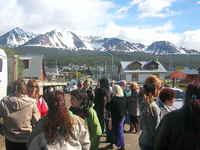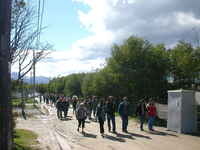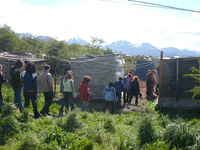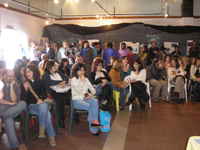Ushuaia: Social housing for an urban world
November 29 and 30 2007
The “Social Housing for an Urban World” Day took place under two intense days of working and a huge meeting of organisations of civil society and local and national representatives as well as international organisations. It was organised by Habitat Network, Argentina ( Red Hábitat Argentina ) and the Urban Social Forum of the Tierra del Fuego Province.
The reception and welcome were done by Gabriela Soto and Alicia Alcaraz. They also explained the days’ programme: on day one, the opening day of activities, there would be addresses and cases demonstrations with the participation of visiting, local and neighbourhood organisations. Day two would start with a visit to the neighbourhoods in the morning, at midday, a working lunch on Parliament with social leaders and in the afternoon, a general meeting and conclusions. Governor-elect Maria Fabiana Rios, will also participate in closing the event.
The Andean musical group Jarcha Marka of the native villages opened the event, and its coordinator told us: “neither an Argentinean Colla nor a Bolivian Colla, just a Colla with the right to a plot of land in these lands.” He also complained about politicians’ insensitivity and about those who invade and take away their lands.
Afterwards, Dr. Manuel Raimbault, Member of Parliament of the Tierra del Fuego province remarked that: “the importance of the day was to begin discussions and debate on some of our province’s issues. In this way, it is providing tools for fundamental issues such as the right to housing, for, without homes, one cannot understand any other human rights and it is very important to begin defining within the framework of the emergency law, the need to establish an interdependent project between the city councils and lay the foundation which, without homes, we cannot think about human rights, because the home is central to other human rights to which they have no access: sanctity of the home, intimacy, family, dignity and we also need to begin to think about the need to discuss the neighbours’ needs and not those of the of the sate.
Silvia Paredes, Coordinator General of the Social Urban Forum of Tierra del Fuego, firstly thanked the city council employees for having lent the venue, who, despite their strike, made it possible for the facilities of the place (Casa Municipal) to be ready for the day. She also thanked the family of the several neighbourhoods who participated and those, who, for various reasons could not attend. She then showed a video on the history of the Urban Social Forum.
Gustavo Poch, representative of the United Nations Information Centre, immediately addressed the audience. “Being a United Nations representative for Argentina and Uruguay and a representative of the information bureau, and not of the projects office, means that we do not have a portfolio of social projects, but that we basically agree with communication, and the information of the United Nations in Argentina. I thank the organisers for inviting us to this debate and to this space for reflection on the issue of housing right, as well as other related issues. I want to underline that the topic of the right to decent and safe housing for all humans, without distinction, has been an important theme for the United Nations since it was created in 1945. Taking into account that it is a fundamental human right, it is inscribed in the Universal Declaration of Human Rights in 1948. Besides, it has also been a mandatory and important theme for several world conferences on human settlements and in the first conference on human housing in 1976, it was pointed out that human settlements were not developing socially.
The International Alliance of Inhabitants, through its General Coordinator Cesare Ottolini, told us “I mean that we are over here at the end of the world, but it seems that even over here, there are problems. Apparently, there is a lot of land but the inhabitants organizations also tell me that there are many homeless persons, and it seems as if 2,500 more will come. I believe that with these days we have an opportunity, to not only debate among ourselves, but also to find a solution for these families, because it would be worthless for us to meet here without proposing a solution, because here, there are not only social movements, but also institutions. This is the International Alliance of Inhabitants’ proposal and I wish to tell you that the International Alliance was born from grassroots organisations….
Starting with speeches and using “the Right to the City” as a slogan, Teresa and Adelina of the Squatters and Tenants’ Movement (Movimiento de Ocupantes e Inquilinos, MOI) related their interesting experience that they have had in the city of Buenos Aires, and people are responding to in the country as well as in Buenos Aires. They are now organising a confederation with their cooperatives and close ones.
Jose Godoy, representative of the Rio Grande October 15th Neighbourhood (Barrio 15 de Octubre de Río Grande) and six other neighbourhoods which have since become part of “New South” (Nuevo Sur), an inter-neighbourhood commission, spoke about their experience as an alternative to solving the housing problem.
The representative of the Undersecretary of Land for Social Housing noted the importance of the working day with civil society organisations and giving support to the settlements.
Under the responsibility of Vanessa Poggioni, Soledad Paniagua and Veronica Fabas from the February 10th, November 11th and Obrero Neighbourhoods, leaders fom the Ushuaia City Council then spoke about “Women, Family and Justice.”
Jorge Lombardi then followed. He told us “I am beginning to feel happy because I share many things, almost all the things that have been said and I am also happy to join this process and to work with you, and I come with ideas to share with you, as a housing policies and technologies researcher as well as an extension of the university, the National University of La Plata.
María Isabel Garzia presented the draft law by Silvia Augsburger (national Member of Parliament), who explained that though not being able to attend, she is present to participate in these international days on housing, in search of a definite solution to the housing problem in Argentina. By this, she presented a synthesis of the draft law on territorial use of land, which has just been presented in the national congress for debate and we suppose that it will be approved further on, as we were also informed that this draft law.... meets the proposals made my national MPs Mariano West and Adgardo Depetris for amendment to Law 24.374 on Land Regularisation (Regularización Dominial de Tierra). It will reduce to three years, prior to January 1, 2008, the time it takes land occupiers to get credit to obtain land for permanent living purposes and it will also regularise lot divisions.
Gustavo Poch of the UNIC spoke about the Millennium Goals and made some important points. These are: a commitment from heads of State and Government, which was adopted at the 2000 United Nations Millennium Summit aimed at ending extreme poverty by 2015; a rational social policy planning tool; an ensemble of quantifiable goals and a period that will allow for the measuring of general progress achieved in fulfilling the commitments outlined in the Millennium Declaration. These results cannot be achieved if the problem of poverty is not treated as a reflection of inequality, and a lack of human rights and social justice. A strategy incorporating a multidimensional view of poverty as a defect. A shared responsibility by the main international financial institutions (the World Bank, the IMF, regional development banks, members of the World Trade Organisation).
After lunch at the Las Rocios Restaurant (very attentive and courteous staff) and on return to the Casa de la Cultura Municipal, the second part of the session began with a presentation of an institutional video from the International Alliance of Inhabitants. Cesare Ottolini invited social organisations and authorities present to join the International “Zero Evictions” Campaign.
Cristina Reynals, Coordinator for International Alliance of Inhabitants’ Southern Region, followed his presentation. She called for a space for reflection and for the “feeling of the inhabitants” to be seen, and for us to join the fight for social housing in Latin America.
From the southern region of the Republic of Chile Alejandra Córdova and Jennifer showed us the situational diagnosis of El Porvenir and the joining of Networks in the Austral Region.
Juan Gomez told us about the resistance and the fight of the workers in the Austral Region as well as of the case of the Fueguina Mill, which began four years ago and is still going on today.
Carlos Gómez, Director of the Fueguitos Autoconvocados Foundation then spoke. He thanked local organisations for having included them in this working day since they had recently worked with his organisation for a year and they began their activities in a local church. He noted that they are collecting signatures for the cancellation of the emergency housing law, to thus be able to continue working with the homeless.
The session continued in the afeternoon with a speech from the team of the Provincial Executor Unit of the Misiones Province (Unidad Ejecutora Provincial de la Provincia de Misiones) with Walter Vogeli, Maria Olga Kunze and Jorge Armando Barrionuevo, who spoke about the various work that had been carried out in the neighbourhoods on basic infrastructure, access to land ownership, strengthening community organisations, improving the quality of life of the population with unsatisfied basic needs and low income, as well as environmental problems and regularisation of ltitles deeds.
From San Martin de los Andes, Walter Morea of the Commission of Neighbours without a Roof and For Decent Homes (Vecinos sin Techo y por una Vivienda Digna) showed us with visual images, the “Intercultural Housing Residential Project” that they are putting into place in their community with the agreement of Lof Mapuche Curruhuinca.
Mrs Claudia Lara, Fabricio Ozuna and Nelson closed the session of the first day of working. They spoke to us about the Institutional Board of the Emergency Housing Law in Ushuaia that is working with the legislature.
Before closing the session, and to allow all the attendees to participate by giving their opinion, they asked that notes be taken of the next morning’s session, to indicate the seriousness of the housing situation in the Tierra del Fuego Province, and that families on the verge of being evicted, be specially accompanied. They also suggested two proposals: that a group write a document during the following day’s session, but that was necessary to begin formalities to keep the venue open until 8 pm since the city council workers were on strike.
Silvia Paredes assumed responsibility for doing this. Members of the CTA invited everyone present to dinner, which was held at its headquarters and they agreed to meet at 9 am in the morning at this same place, for a visit of the neighbourhoods.
On Friday 30.11.07 at 9.30 a.m. the visit to the neighbourhoods of Dos Banderas, Escondido, Barrio Obrero, La Bolsita, Barrio Nuevo, Mirador de Ushuaia, Diez de Febrero, Valle de Andorra, Altos de la Cumbre, La Bombonera, Felipe Varela, Bella Vista, Esperanza II, Cañadón, 11 de Noviembre began. Then at 1 pm, there was a working session on the Parliament with visiting organisations, where they came up with the first working suggestions in search of a definitive solution to the problem of adequate housing for the province of Tierra del Fuego.
Activities resumed at 3 p.m., with presentations from visiting organisations which commented on the visits to the neighbourhood; Adelina and Teresa from the MOI, Carlos Armando for the Federation of Villas in the Independent City of Argentina, Susan Funes of the Civil Association of Boca, Our Home, Dr. Patricia Fernandez of the Office of the Human Rights Advice in the Region NEA- Chaco Resistance, all moved by the situation in which they live, where they have to enter to visit families in economic difficulties, and without basic services in many cases and with police guards at the entrances, who frisk the neighbours at the entrance and check the rucksack of school children, according to statements collected during the trip. They also said that they were deeply touched by the realities that they have to live, and they suggested taking concrete actions in unison.
In continuation, and in keeping with the suggestions of the previous day, they were asked if they wanted to work in the Assembly General or in three Commissions to tackle the problems and to generate the document. In the first round of consultation with the participants, they decided to work together in the room and that the document being written should have the signature of all the attendees and that it be delivered to the governor-elect of the province since she had expressed her commitment by her presence. It was also decided that the speech of each person at the assembly be made without microphone since this facilitated communication with everyone.
After a very rich and extremely important debate and the presence of the governor-elect of the province (whom we ask for a little time to finalise the document) the document was finished and signed by the attendees.
Silvia, Alicia and Gabriela from the Urban Social Urban were asked to close the working day. They highlighted that we can work in dissension and give a major boost to the new work proposals and not only show that we do not want poverty, but also strengthen the human capital, human development and continue growing with the networks. They also thanked everyone for having travelled to Ushuaia and having put their hearts to this, because it helped them to reflect and to commit themselves more, and those who were involved as well as those who were not, joined in. Clearly, this is the start of a new step, and we thank everyone for helping us, and we want to tell everyone present that according to the reports that we have and way beyond the all the efforts, that are being made, the courts have informed us that they are prosecuting a new neighbourhood, and one of the central points of the document has to do with this. Since we all know that the courts respond to an economic model, for us, this work has had a great impact on a lot of the public and we are starting to have a society that is interested in these themes for a better life; this is the challenge, and thank you very much to everyone.
María Fabiana Ríos, the governor-elect of the Tierra del Fuego province was asked to close the “Social housing for an urban world” day:
“Firstly, I would like to thank the organisers for letting me close the day, but I also want to tell them that I only came to accept the demand that you have created, elaborated and discussed today , but in the long term, and it is a very complex social process here in Tierra del Fuego and it should undoubtedly regain and strengthen solidarity links, citizenship links that are certainly in a terrible state. When you speak of the agreements reached despite dissent, we look at social construction. We have to build agreements from dissent where each opposition is viewed as impregnable enmity and impossible to establish links between each other.
And if we speak of land and if we speak of settlement and of the need for someone to know that they have a place to shelter. In accordance with our history, men and women, search for a place for protection, for shelter, and the truth is, the problem in our province has become serious since we come from a state that has not listened to us, that has not looked at us, that has not listened to our demand and that has not opened the channel of discussion so that this (act) can be in some way, a look to the state, which is, the one that has to resolve them, the problem and we need to look much less toward our society.
On behalf of the government, receiving this document implies a full engagement, from glancing at it to discussing it, from opening the resolution request, which without a doubt is reiterated since they are joint resolution requests; participative requests that should have neighbours as main players and which should have the commitment of the institutions. If we manage to engage the nation, the city councils and the province, urban development, social development public health works, education, for all areas to treat the housing issue as a right. Surely, we will have solutions, we are betting on this process for homes and the non-judicialisation of poverty. We have to continue on this path, convincing ourselves that only through dialogue and with tolerance and dissent that we will be able to do something and to fundamentally open the channels of civic participation, and I am very thankful. This government’s channels of communication are open, and with rules, with rules that we all control the state. Good evening and thank you very much everyone for your work.”
The document signed by all the organisations present was handed over to her. Cesare Ottolini presented an International Alliance T-Shirt and its “Zero Evictions” campaign sayng he placed his confidence in the governor and invited the participants to take a step to show the artistic exhibition of pictures “While they are peeing, the press says that it is raining.”
Photos: thanks to Red Habitat Argentina
Coordinators for the Network: Silvia Paredes, Alicia Alcaraz, Gabriela Soto, Fernando Ojeda
Ushuaia, November 30th, 2007
The undersigned met at an assembly called the “Social Housing for an Urban World”, Ushuaia, Argentina, November 30th 2007.
They denounced
- The violations of housing and land rights by the provincial and municipal state, and national organisations, as well as the legislative and judicial power. This affects a large part of the population of Tierra del Fuego: tenants and squatters because of the absence of public urban policies and adequate and sustainable housing.
They express
- SOLIDARITY with the social organisations in the fight;
They propose:
IMMEDIATE ACTIONS:
- Guarantee the application of Law No. 746 within the framework of a Socio-Political Alliance;
- Call a roundtable and management study group to establish a Status Quo with state actors, the Legislative-Provincial Judicial and Municipal powers, social, territorial, citizen organisations within the framework of starting a discussion process and the creation of Housing and Land Policies;
- Demand the immediate dejudicialising, dropping of all charges and the decriminalisation of neighbours who have been charged, and the immediate withdrawal of police warnings in the Neighbourhoods;
- Launch a Zero Evictions campaign promoted by the International Alliance of Inhabitants.
PROPOSALS
- Guarantee the start of a Participative-Multidimensional PLANNING PROCESS, Integral look at ENVIRONMENTAL PROTECTION AND HUMAN PROTECTION;
- Participate in the Global Mobilisation called by World Social Forum on January 26, 2008;
- Create a Popular Land and Housing Fund, specifically allocated from the Public budget;
- Create a business contribution fund;
- State regulation obliging businesses to invest in housing – Decent working conditions. Housing for workers.
- Population assessment. Hold a census to redesign state POLICIES that guarantee a process of SOCIAL INCLUSION AND EQUITY;
- Priority in attributing major investment in service infrastructure and community equipment.
- Form a network among social organisations;
- Organise internships/interchange between organisations;
- Legalise the social production of housing, incorporate self-management, self-building, cooperative experiences, etc.;
- Redesign existing PHI (IPV) policies;
- Make an appeal to social organisations at the national and international level to join and participate in this fight.
With the adherence and engagement of the undersigned:
RED DE HABITAT – MOI (movimiento de Ocupantes e Inquilinos) – ALIANZA INTERNACIONAL DE
HABITANTES – JORGE LOMBARDI (UNIVERSIDAD DE LA PLATA) – JENNIFER SMITH PORVENIR –
CHILE – CESARE OTTOLINI-ALIANZA INTERNACIONAL DE HABITANTES– NELSON HEREDIA
PRESIDENTE BARRIO OBRERO – CARLOS GHIOMI – MARIANAN QUIROGA- SILVIA PAREDES FSU –
WALTER MOREA ,SAN MARTÍN DE LOS ANDES – AZUCENA ROMI-CLAUDIA LARA BARRIOESCONDIDO- GALLARDO SUSANA-MAIRA IBÁÑEZ BARRIO 11 DE NOVIEMBRE- DIEGO CRESPO CTA
–FSU – SUSANA RIZZO- CETINL- JOSE QUIROGA BARRIO 11 DE NOVIUEMBRE- VERÓNICA FABAZ
BARRIO 11 DE NOVIEMBRE-JOSE SALISQUE BARRIO 10 DE FEBRERO- MRUSSISTTO-LUIS TORRES
DOS BANDERAS, MA CAMPA IPV- ALEJANDRA CORDOVA PORVENIR CHILE, ALICIA ALCARAZ FSU-
ARQ. PATANE TRELEW CHUBUT- SERGIO BOGADO BARRIO 11 DE NOVIEMBRE- FABRICIO OZUNA
BARRIO LA BOLSITA – CRISTINA REYNALS( FEDEVI-AIH-LPU)- TERESA ROMERO (MOI – CTA)
CALAÑO RAMONA LA BOLSITA- SANDRA CARNEVALE LAS RAICES- MARCELA SOTO – ALTOS DE LA
CUMBRE- ALEJANDRA MARTINEZ- NORBERTO FERREYRO BARRIO 11 DE NOVIEMBRE- DORA
CHECLALICHE- ADELINA ROMAN (MOI CTA)-FERNANDEZ MONICA BARRIO 22 DE JULIO RIO
GRANDE- MARIA GOMEZ BARRIO NUEVO- INES QUIROZ BARRIO 11 DE NOVIEMBRE-. FERNANDA
JAIMERENA LIC. TRABAJO SOCIAL- GABRIELA SOTO CTAARIEL VAZQUEZ BARRIO 11 DE
NOVIEMBRE- MATIAS ROSSTO BARRIO 11 DE NOVIEMBRE- MIRIAM GARCIA LA BOLSITA- ARQ.
MARIA OKUBE (PROMEBA MISIONES)- ING. MIGUEL VOGIL (UEP MISIONES) CARLOS ARMANDO
FEDEVI CAPITAL FEDERAL- DANIEL CONCA- IGNACIO SOSA APDH – ANDREA CERVANTES RED POR
LA IDENTIDAD, ABUELAS DE PLAZA DE MAYO- GUILLERMO BARRANTES- OSCAR LUNA – TERESA
PAREDES MOVIMIENTO EVITA- FERNANDO OJEDA RED DE HABITAT- DANIEL SANDOVAL JULIA S
FUNES 8 NUIESTRO HOGAR LA BOCA – BSAS- RED DE HABITAT- GUADALUPE GARAY BARRIO DOS
BANDERAS- EUSEBIA FLORES BARRIO 10 DE FEBRERO- ISABEL CHAVEZ BARRIO 10 DE FEBRERO-
DR. MANUEL RAIMBAULT- MARIANA ROSSI- ANALIA BECERRA- AZUCENA BARNI- CRISTINA CERDA
CAÑETE – MTL BSAS- CUT CHILE – SIOTEF- CTA.
(a las 20.00 HS DEL DIA 30 DE NOVIEMBRE DE 2007).




